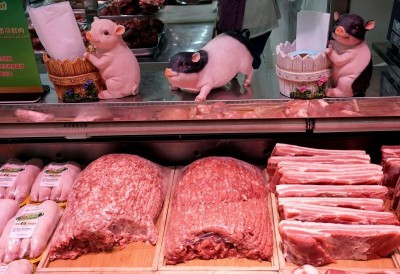China is now green-lighting higher subsidies to both consumers and farmers to stop pork prices from rising sharply and supply shortages as the hemorrhagic viral disease of domestic and wild pigs that causes the animal's death within a week of infection continue to hit the country's livestock.
Though not harmful to humans, it's deadly for pigs. Since there is no vaccine, this disease can cause serious economic losses.
Being the largest pork consumer, the outbreak is making inflation rise in China.
Available data shows China, in 2017, consuming 54 million tons of pork, half of the world's total.
The mainland imports 1.2 million tons with more than half of this coming from France, Germany, Spain, and the United Kingdom.
On August 25, a food vendor was quoted verifying that pork prices go up to about "one to two yuan per jin (500 grams) every day."
In July, the consumer price index showed inflation at 2.8 percent. The annual control target is 3 percent.
Prices of pork are the contributor of 0.59 percent of that index.
Beijing stepping in because of the swine fever is also in connection with the government helping consumers and stabilizing market sentiment especially of those affected with income changes as the trade issues with the United States continue.
Chinese netizens are complaining about social media of not being able to buy pork anymore because of its high price.
China's 29 provinces have started its own measures to cope and since April, when the disease started spreading, had paid out more than 2 billion yuan (US$281 million) in consumer subsidies.
The Licheng district government of Putian City, Fujian Province, for example, pays 4 yuan ($0.56) per kilogram of pork so retailers can sell their pork lower.
Likewise, each farmer should receive 1,200 yuan ($170) for each pig culled to stop the disease.
Still, the subsidies are either not available everywhere or sometimes, the subsidies are small.
Since the outbreak in China started on August 1, 2018, in Shenyang, the capital of northern China's Liaoning Province, transport restrictions had been implementing coupled with mass culling amounting to a million animals already getting slaughtered reducing their population by a third.
When the agriculture ministry reported last Friday that the price of pork had already risen to 26 percent higher than the previous month hitting 30.79 yuan per kilogram due to falling domestic production, the State Council, China's cabinet, took matters in its own hands.
China's central government will take more effective measures to stop the disease from spreading while also removing local restrictions on pig farming and transport.
The government will let farms relocate, hasten the payment of compensation subsidies, implement large-scale production and allow piglets and chilled pork to be exempt from highway toll fees.





